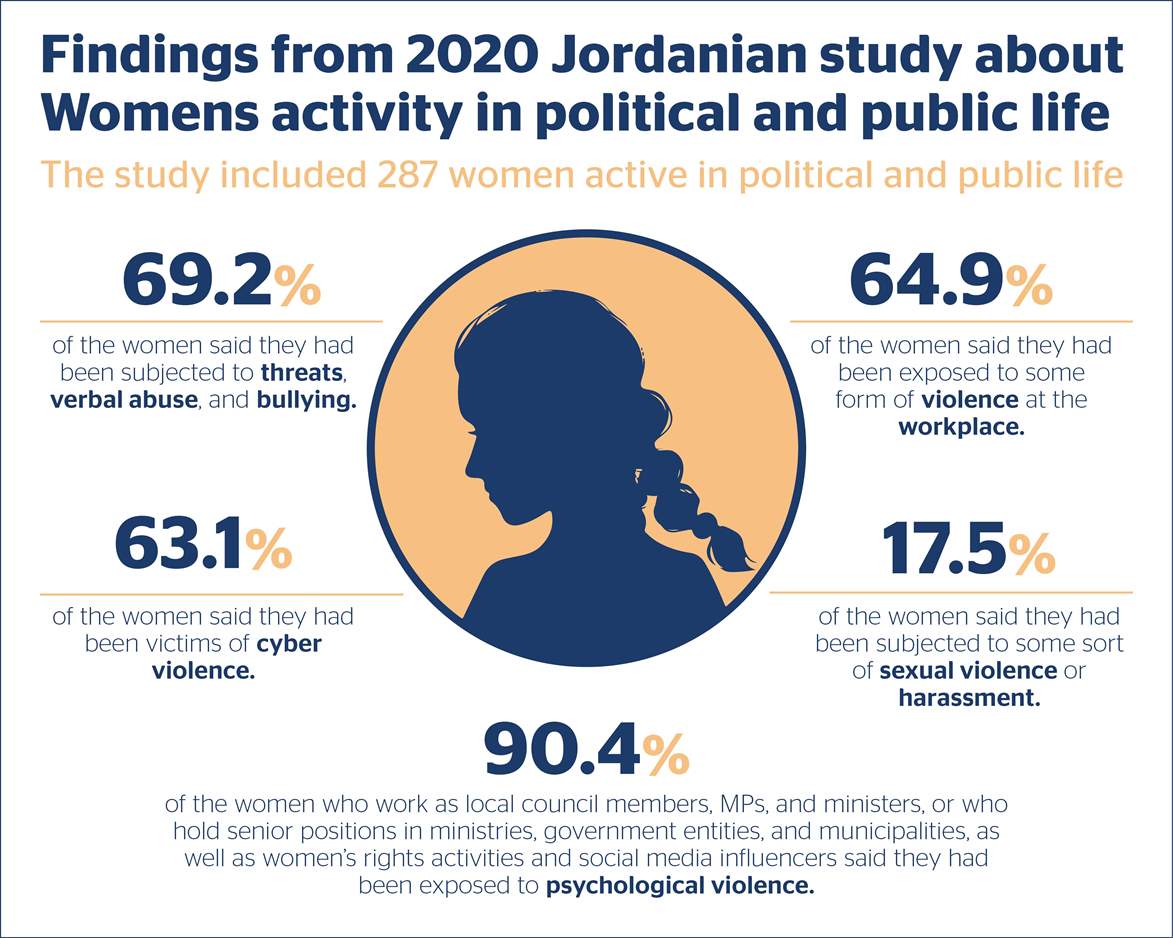AMMAN — The
international campaign “
16 days of activism against gender-based violence (GBV)”
kicked off in Jordan on November 25, as the Kingdom joined world countries in
organizing advocacy, awareness, and mobilization campaigns led by the
Jordanian National Commission for Women (JNCW) in collaboration with stakeholders and
partners, namely the Shamaa Network to Combat Violence Against Women.
اضافة اعلان
“As
part of the campaign, our teams work on developing sensitization material,
mobilizing the media, and publishing papers and studies. We launch the campaign with a press
conference with the participation of the Network members and donors, and we end
it with a closing ceremony attended by Princess Basma Bint Talal,” said Dania Al-Hajouj,
the Women Protection Program coordinator and coordinator of the GBV Network at
the JNCW.
The JNCW is developing 10 awareness-raising
workshops in 10 governorates across the Kingdom on GBV, this year focusing on
violence against women in political life, covering the religious and legal
dimensions, as well as the social impact of women’s participation in political
and public life and the challenges they face.
Other workshops will tackle cyber violence
and how women should react to incidents of cyber harassment.
The Shamaa network includes 102 members
from public and private sector entities, civil society as well as human rights
activists.
Each year, the network implements about 300
activities nationally, and the campaign themes are selected based on an inclusive
consultative approach, covering awareness-raising videos, workshops, theatrical
plays, conferences, murals, and publications, according to Hajouj.
JNCW assists a number of low-budget partner
organizations through funding some of their activities.
Public sector partners in the Shamaa
network are the Ministry of Awqaf and Islamic Affairs and the General Iftaa
Department, in addition to the Ministry of Social Development, which conducts
its activities through the Family Protection Department.
UN Women, alongside other UN agencies, is
taking part in the campaign — which runs until December 10 — as one of the partners
in the UN Secretary General’s 2030
agenda to end violence against women, focusing in this year’s campaign on all
forms of violence against women and girls.
“At the UN, we work
with our partners on a broad scale and on all forms of violence against women,
while in Jordan, we nationalize and contextualize the campaign based on the
priorities and on the national context,” said Susan Al-Hilo,
Advocacy and Youth officer at UN Women, who is leading the advocacy campaign of
the 16 days of activism.
“It’s a very global campaign that anyone
can take part in, individuals, journalists, youth, absolutely anyone,” said Hilo.
UN Women Jordan will be working with different organizations, sister agencies, civil
society organizations, public and private entities, communities, and youth to
ensure that the campaign is as inclusive as possible.
“We are going to break the silence on the different forms of political
violence so that more women and girls have equal rights to participate and lead
in life without being subjected to any form of violence or being forced to act
against their choice,” said Hilo.
While the campaigns target all segments of
society, including men and women, each aspect of the campaign targets a
specific group, such as political and religious leaders, youth, students, and
various media channels.
“We do not only focus on women and ignore
the other half of the society, because, at the end of the day, political
violence affects women inside their households as well,” said Hajouj, providing
incidents of when the men in the family force women to vote for a particular
candidate, or when women are forbidden to run for elections or to have a
political career.
 (Photo: Jordan News)
(Photo: Jordan News)
“We have an evidence-based approach as we
always try to have official data and key messages to podcast to the general public,
based on the findings of studies carried out,” said Ghaida Al-Bitar, JNCW’s
Protection against Violence project officer and member of the team working on
the 16 days campaign.
The 2019 campaign targeted the elimination
of economic violence against women, while the 2020 study addressed domestic
violence, said Bitar, pointing out that the choice of political violence this
year was not made randomly, but because Jordan will soon hold municipal
elections, “which signals the perfect timing to start working with the
government to establish violence-free processes that encourage women to
participate.”
Apart from GBV, the JNCW works on underage
marriage and sexual harassment. The 2020 campaign, for example, focused on
domestic violence in light of a study that found a 33 percent rise in cases of
domestic violence during the COVID-19 pandemic
lockdowns.
A December 2020 study that covered the Kingdom’s
governorates targeted a sample of 287 women active in political and public
life, the findings of which will be published during the campaign.
64.9 percent of the women who participated
in the study said they had been exposed to some form of violence at the
workplace, while 90.4 percent of the women; those who work as local council
members, parliamentarians, and ministers, or who hold senior positions in ministries,
government entities, and municipalities, as well as women’s rights activities
and social media influencers said they had been exposed to psychological
violence.
69.2 percent have been subjected to threats
and verbal abuse, and bullying, while 17.5 percent of the surveyed women said
they were subjected to some sort of sexual violence or harassment, and 63.1
percent said they had been victims of cyber violence.
The JNCW is currently working on a study
titled “Women’s Killings and the Decisions Made by Judges,” the findings of
which will be published on December 6, during a national event related to
femicide in Jordan.
Read more Features



